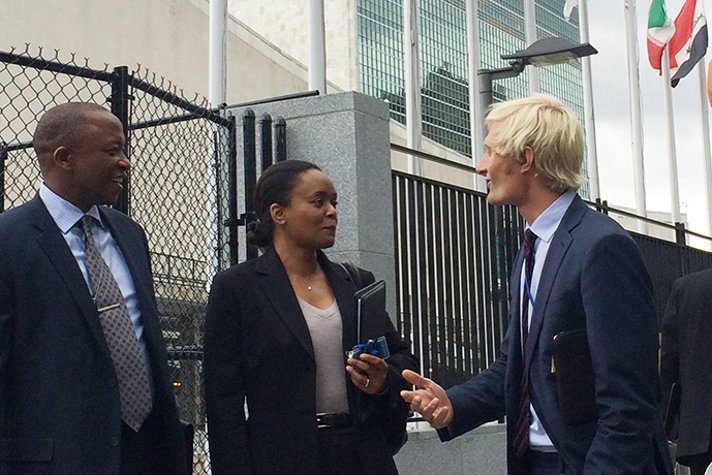Why Sweden wants to be on the Security Council
Published Updated
If Sweden wants to take responsibility and influence world politics - then we should be on the United Nations Security Council. The entire Government will join in the efforts to secure Sweden a seat in 2017-2018

It couldn't be any plainer. Prime Minister Stefan Löfven emphasised it in the Statement of Government Policy. It was the first point Margot Wallström raised on her first day as Minister for Foreign Affairs. Sweden's candidacy for a seat on the United Nations Security Council in 2017-2018 is going to be very much in the spotlight.
"It's a matter of taking responsibility for multilateral cooperation in an insecure world with conflicts in many places. The Security Council is a unique platform that offers the opportunity to communicate Swedish peace policy, influence the course of global politics and make sure our agenda has an impact," says Ms Wallström.
"Take the developments in Syria, Iraq or Libya, for example. Of course we're working through the EU, bilaterally and in the UN framework. But in the Security Council, you're one of the countries setting the political framework," she continues.
State Secretary for Foreign Affairs Annika Söder emphasises that a campaign for election to the Security Council is about what you want to achieve, not just about getting elected.
"How can we use the seat on the Council, as one of 15 members, to make a difference and take responsibility? We want to get the Security Council to work better, to try to get more countries to understand that the politics of war and peace are ultimately about people. True power is not just a matter of muscle, it's also a matter of cooperation," says Ms Söder.
In recent years, Sweden's foreign policy ambitions have been very much oriented towards Brussels. But now it's a matter of more clearly taking New York as a political arena as well. The entire Government, spearheaded by Prime Minister Löfven and Minister for Foreign Affairs Wallström, will be actively involved in the candidacy, with the Permanent Mission of Sweden to the United Nations in New York at the heart of it all. Diplomat Carl Skau is leading the campaign on the ground at UN headquarters.
"Sweden has traditionally had a strong role in the UN. A seat on the Security Council would confirm that role. The status conferred by having been a member of the Security Council would be an advantage to us afterwards for a long time to come, in much the same way as when we had the EU Presidency. All the more so if Sweden's time on the Council is associated with strong commitment and concrete results," says Mr Skau.
Several topical issues suit Swedish commitments particularly well. A good deal of the Security Council's work currently centres around Africa, where Sweden has particularly strong traditions as a donor and cooperation partner.
"Our strength lies mainly in the softer parts of security work. At the same time, the link between development and security is topical, and this is a dimension Sweden wants to strengthen," says Mr Skau.
Much of the practical campaigning will take place in New York, where Mr Skau and his colleagues at Sweden's Permanent Mission sit cheek by jowl with 193 other countries. A team at the Ministry for Foreign Affairs acts as a service organisation at home. And the third side of the triangle, of course, are all Sweden's embassies and consulates.
The challenge is that three EU countries are competing for two seats: Sweden, the Netherlands and Italy.
"Sweden was the first of these three countries on the scene, announcing our candidacy back in 2004. Also, in 2017-2018 it will be exactly 20 years since we last sat on the Security Council. It will also be ten years since a Nordic country was in that position, and our candidacy has the full backing of the Nordic countries. The new Swedish Government has already moved up a gear on the candidacy, which is now being carried forward vigorously," says State Secretary for Foreign Affairs Annika Söder.
The starting signal has already sounded. The campaign will reach the finishing line in spring 2016, when the United Nations General Assembly votes on which countries will be on the Security Council.

 X
X